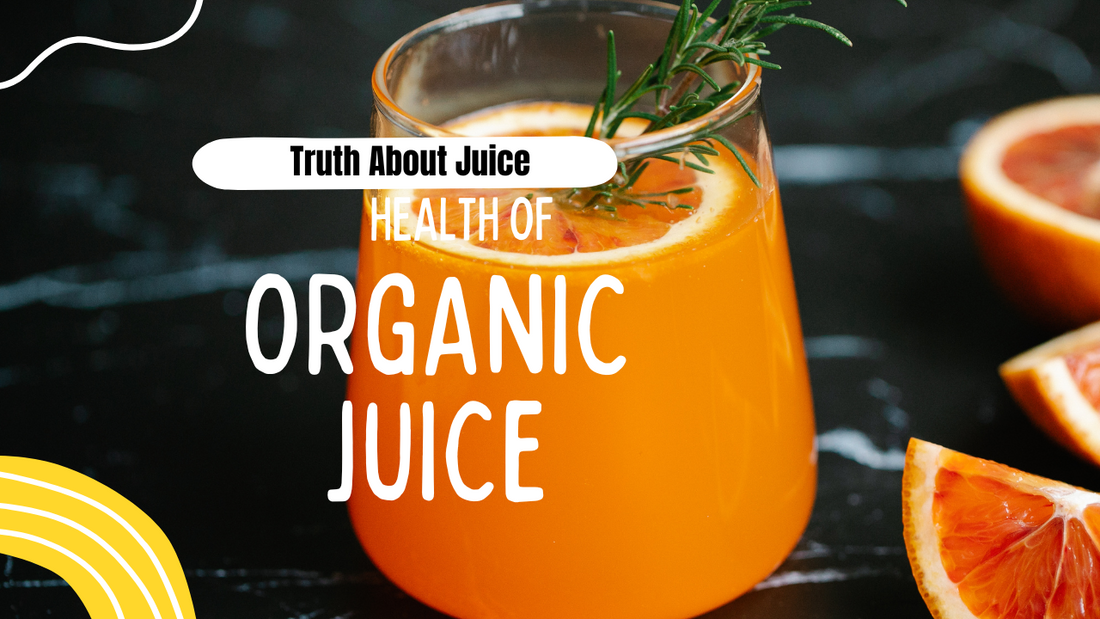The Truth About Organic Juice: What You Really Need to Know

🌱 What Does “Organic” Really Mean?
“Organic” isn’t just a marketing word. It’s a farming standard.
-
No synthetic pesticides or fertilizers
-
No GMOs (genetically modified organisms)
-
No artificial preservatives, colors, or flavors
-
Soil-friendly farming — crop rotation, composting, and natural pest control
To carry the organic label, at least 95% of ingredients in your juice must come from certified organic farming.
But here’s the catch: organic doesn’t always mean “healthier” — it means “grown differently.”
🥤 Organic Juice vs. Regular Juice
Here’s a quick comparison of organic juice and regular juice:
| Aspect | Organic Juice | Regular Juice |
|---|---|---|
| Farming Method | Natural compost, no synthetic pesticides, soil-friendly farming | May use chemical fertilizers and pesticides |
| Nutrient Content | Slightly higher antioxidants & vitamins (depends on soil & fruit) | Similar major nutrients, may have trace pesticide residues |
| Shelf Life | Shorter (no synthetic preservatives) | Longer (due to additives & stabilizers) |
| Price | Higher (20–40% more expensive) | More affordable |
| Taste | Fresh, natural, robust | Consistent but can taste processed |
🧃 The Hidden Truth About Organic Juice
There are a few myths about organic juice you should know:
1️⃣ Organic Doesn’t Mean Sugar-Free
Organic fruit juice still contains natural sugar. A 250ml glass of organic orange juice may have as much sugar as regular orange juice — around 20–25g.
2️⃣ Calories Are the Same
Organic juice has the same calorie count as non-organic juice. If you’re counting calories, there’s no difference.
3️⃣ You’re Paying for Farming Practices
The higher price reflects the farming method (organic cultivation), not necessarily more vitamins.
4️⃣ Not Always “Fresh-Squeezed”
Some organic juices are made from organic concentrate — which means the juice was processed and reconstituted with water later.
✅ Benefits of Choosing Organic Juice
Despite these truths, organic juice does offer some real advantages:
-
🧪 Lower Pesticide Exposure – Especially important for children, pregnant women, and people with health sensitivities.
-
🌎 Better for the Environment – Supports soil health, reduces chemical runoff, promotes biodiversity.
-
🧾 Cleaner Labels – Usually no artificial flavors, colors, or preservatives.
-
👅 Better Taste – Many people find it fresher and closer to homemade juice.
⚠️ When Organic Juice Might Not Be Worth It
Organic isn’t always necessary. You can skip it when:
-
You wash or peel fruits at home – This removes most pesticide residues.
-
Budget is tight – Regular 100% juice still provides vitamins, minerals, and hydration.
-
Juice has added sugar – “Organic cane sugar” is still sugar. Look for “no added sugar.”
💡 Tips to Make the Healthiest Juice Choice
Here’s how to make the most of your juice habit:
-
Read the Label – Look for “100% juice,” “not from concentrate,” and no added sugar.
-
Watch Your Portions – Stick to 150–250ml servings to avoid excess sugar.
-
Pair with Meals – Drink juice with a meal to slow sugar absorption.
-
Mix It Up – Dilute juice with water or soda water for a lighter drink.
-
Support Trusted Brands – Choose companies transparent about their sourcing (like Dadu Fresh 😉).
🥗 Bottom Line
The truth about organic juice is clear:
✅ It reduces pesticide exposure
✅ It supports sustainable farming
✅ It tastes fresher
But it’s not automatically healthier or lower in sugar than regular juice.
If you can afford it, organic juice is a great choice — especially for fruits like berries, apples, and grapes (which usually carry higher pesticide residues). But if not, regular 100% juice is still a nutritious, hydrating option.
